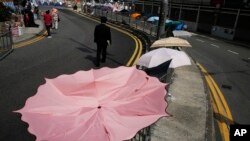It has been exactly one month since Hong Kong riot police fired tear gas at large crowds of young pro-democracy activists, sparking the occupation of the central business district and outlying commercial areas. Protesters and politicians paused Tuesday to reflect back and discuss the way forward.
Tuesday dawned amid a sea of 2,000 tents and countless democracy activists on the streets of the Hong Kong Central business district.
In the cool breeze, a group of students marked the end of the first full month of the democracy protest by singing the lilting refrain of the Umbrella Movement anthem, Under a Vast Sky.
The spirit of the activists is typified by 23-year-old Audrey, who says she is heartened that after 30 days of solidarity, of sometimes violent struggle and failed negotiations, the Umbrella Movement persists, albeit with a degree soul-searching.
“It is like a utopia, especially here in Admiralty. Some say it is a revolution of the romantics and academics. But there are quite a lot of people who say we should be fighting more. Others say we should not bleed over this, otherwise it will be like the Tiananmen [Square massacre]," said Audrey.
Various factions
The past few days have presented some signs of disagreement between the three groups leading the movement.
Benny Tai, co-founder of Occupy Hong Kong with Peace and Love, insists the movement could engineer a citywide referendum to challenge a Beijing ruling that candidates for Hong Kong's 2017 election be vetted by a pro-China nominating committee.
Sharing this view is Hong Kong Federation of Students head Alex Chow. But another influential Federation leader, Yvonne Leung, is not persuaded. She believes there are other priorities.
“We need to think how to further pressurize the Hong Kong government. Is the Hong Kong government [even] the right target to continue to ask for something? Because, it is quite clear that in the short term, the Hong Kong government has nothing else to offer," said Leung.
Divergent opinion reflects the robust health of the movement, insists the chairman of the pan-democrat Civic Party, Audrey Eu.
“In fact, that is the essence of democracy - that everybody has his or her own view. And I think the Umbrella Movement has brought Hong Kong people together in a way that has not been the situation for a very long time. The goodwill is there," said Eu.
Preparation, strategy
Hong Kong University public administration professor Joseph Chan helped prepare the students for negotiations with the government last week. While opinion polls indicate more Hongkongers back the students than ever before, Chan reflects the view of a broad section of society that feels they have conducted an exemplary civil disobedience campaign, but should resume talks with the government and find other ways to continue their protest or risk losing public support.
“There is such a danger. It seems the movement is going nowhere and there is no dialogue between the government and the students. And so the public might raise questions about what they are going to do now," said Chan. "‘Yes, we are willing to support you, but for what purposes?’”
Late Tuesday, the students continue to strategize, and sing, at the now nightly rally in Umbrella Square. As the strains of Under a Vast Sky fade, its lyrics, sung by thousands, resonate into the second month of the Hong Kong democracy protest.




